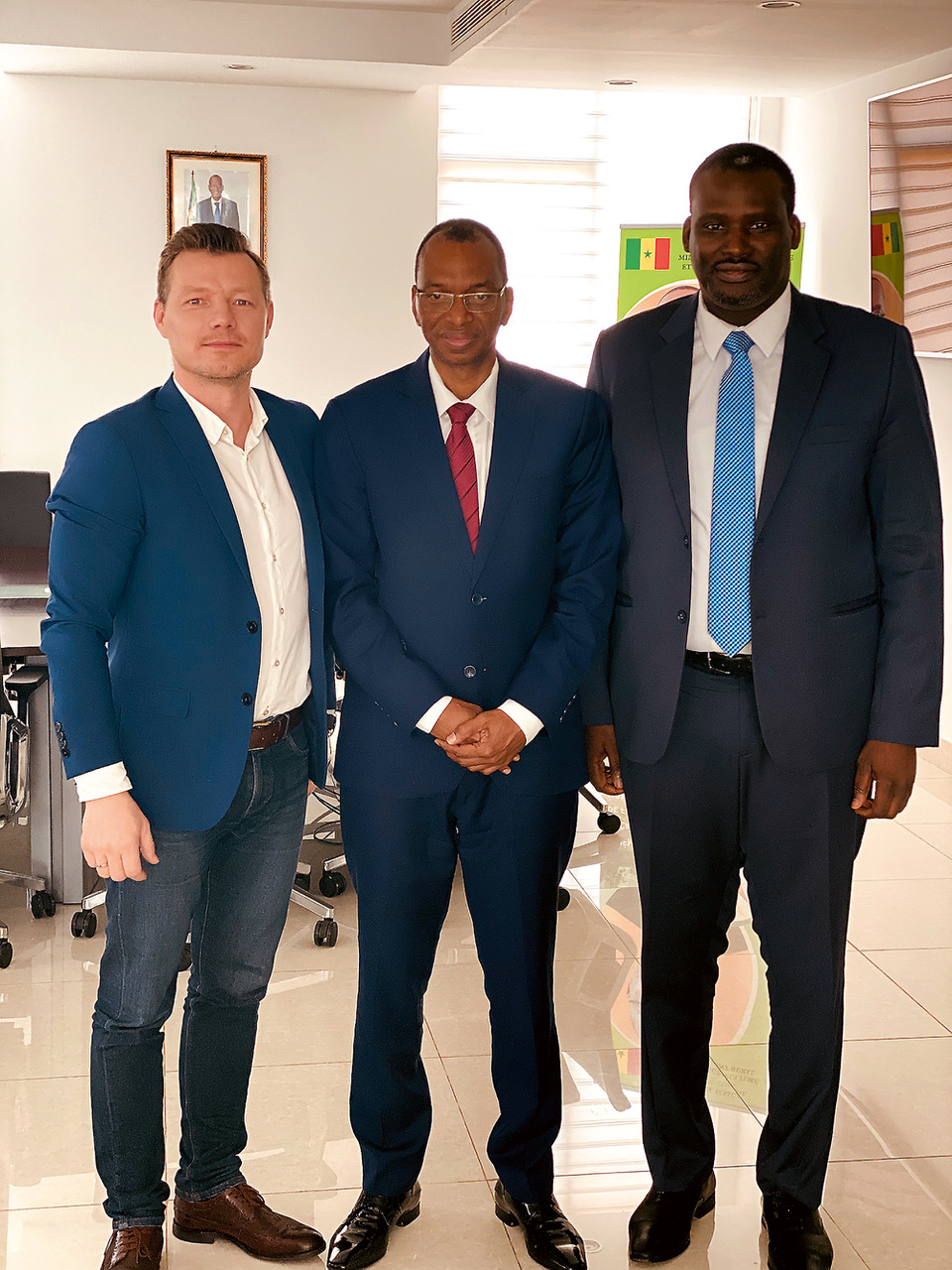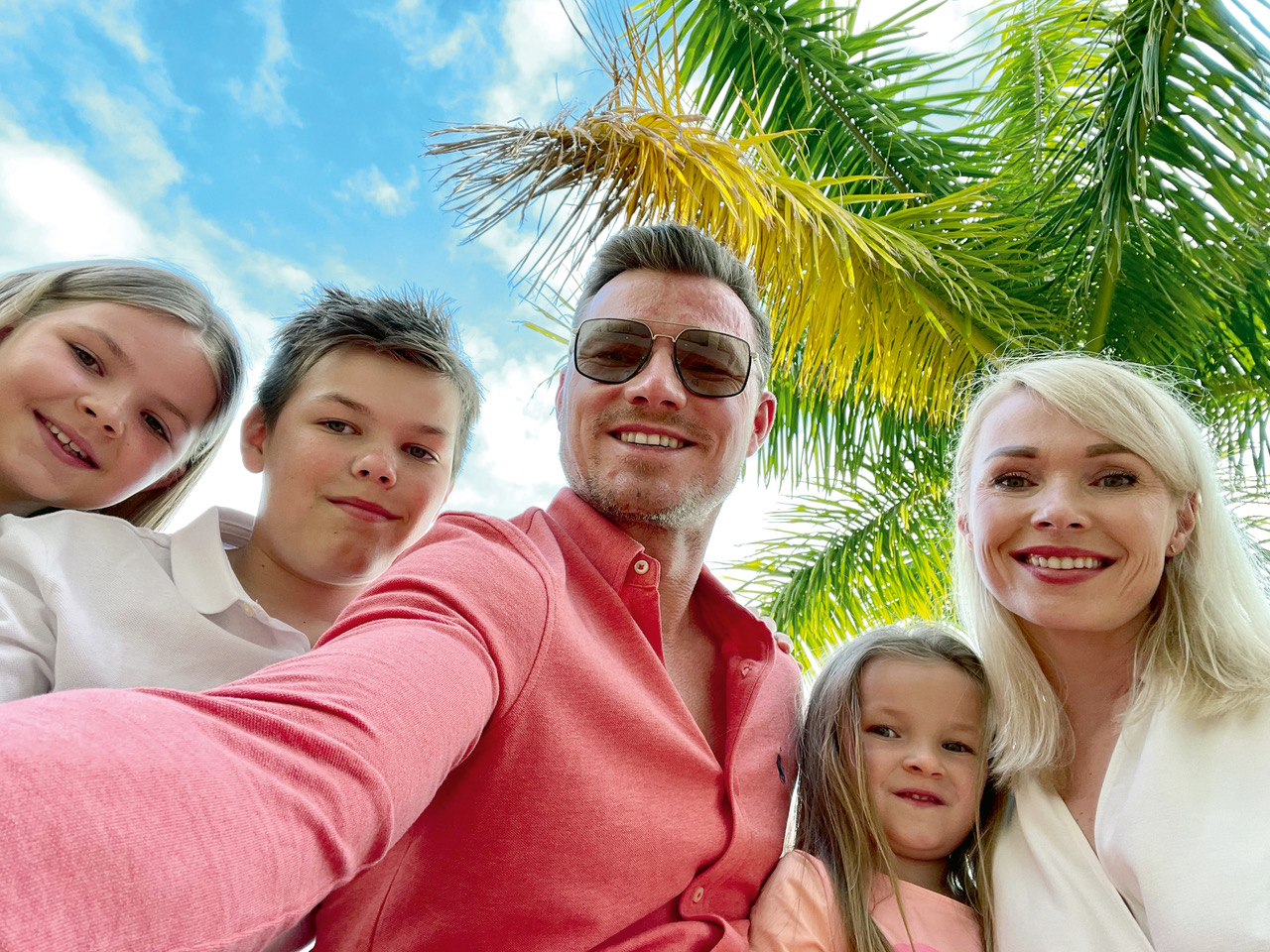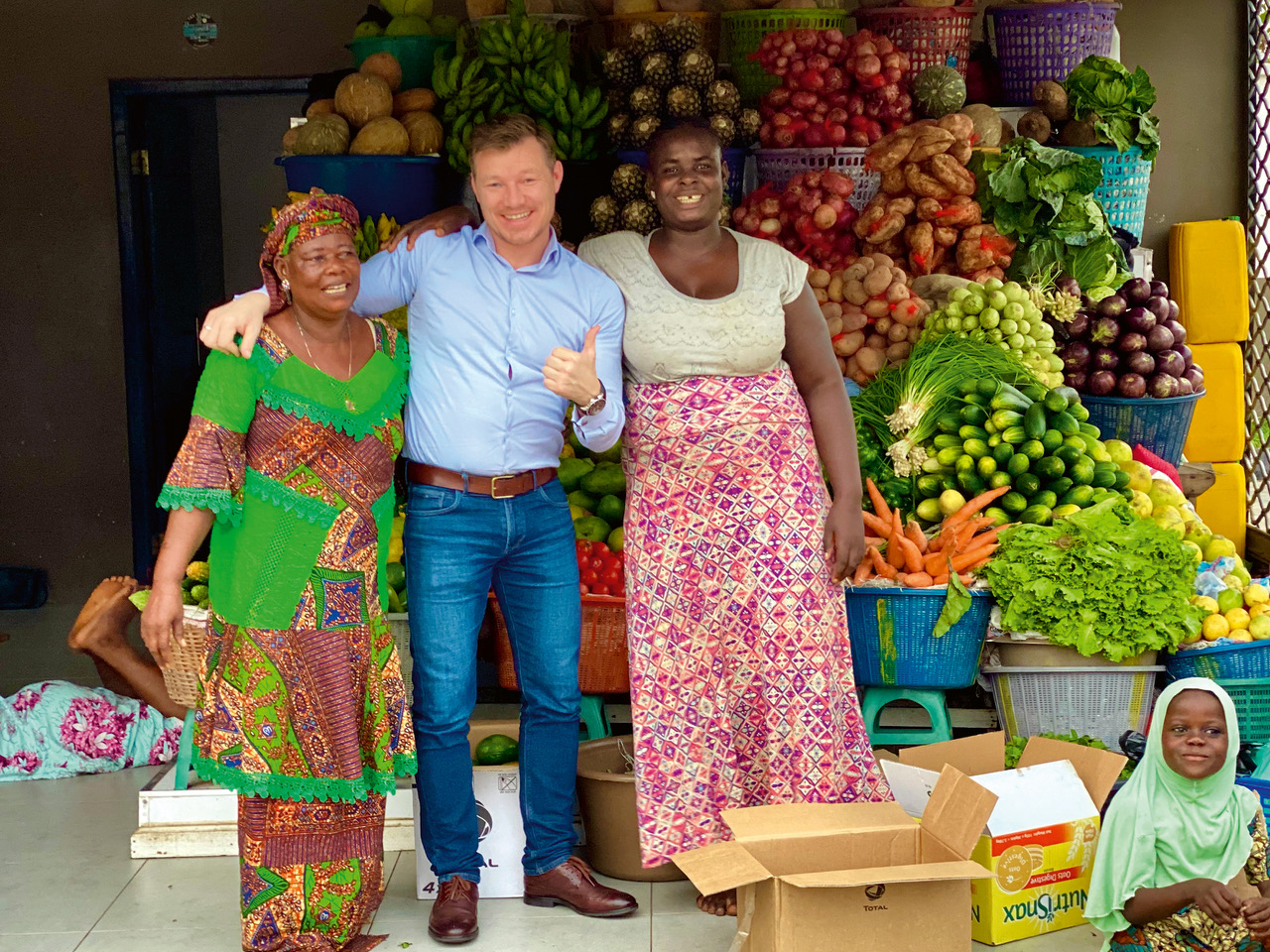Cēlājs: Latvian Businessmen Have the Gene of a Winner

Prior to this interview, Ģirts Cēlājs completes a phone call with his partners in Liberia. The discussion was about suitable fertilizers to boost the soil. Cēlājs is from Liepāja, and he is the director of nine companies, including the NPK Expert brand, which is powerful in the sector. The company exports soil nutrients to 40 countries in the world, including ones in Africa and Central America. Ģirts is also one of the most active members of the Red Jackets team in the Latvian Association of Exporters. He is a member of the Latvian Business Angel Network, as well as the representative of the Economic Community of West African States at the Latvian Chamber of Commerce and Industry.
Ģirts Cēlājs: Dossier
- Director of nine companies which specialise in the manufacturing and export of mineral fertilizers, innovations in the area of agriculture, real estate development and the manufacturing of electrical racing karts;
- NPK Expert is directly represented in Great Britain, Spain, Lithuania, Ireland, Ghana, Cameroon, Senegal, Brazil and the Dominican Republic;
- Ģirts has developed more than 300 formulae for mineral fertilizers, and together with inventor Alan Amron, he has made patent process for "smart fertilizers";
- Ģirts is married and has three children;
- He supports start-ups, children with special needs and sports while being an active athlete himself, engaging in hockey, tennis, golf and snowboarding.

Q: Do people ask you how you turned from a banker into someone who mixes up Molotov cocktails?
A: Before starting my private business, I did work for banks, but you don't have the right idea about the recipes of mineral fertilizers. Your statement was stereotypical. Mineral fertilizers in the field of agriculture are very different, and they are necessary to enrich the soil. This is a business niche with much potential, because the amount of arable land in the world is shrinking while population numbers are rising. Everyone needs food, and output can be more effective if the right combinations of mineral fertilizers are used so as to ensure that the soil is more fertile. People need a good combination of Vitamins A, B, and C, and any plant needs a combination of nitrogen, phosphorus and potassium – N-P-K. Chemical symbols are the origin of the company's name -- NPK Expert. Mineral fertilizers allow any plant to be stronger, more durable against weather conditions, and grow more quickly.
Q: Did you think about business when you were a student?
A: When I was in high school, I became involved in the Junior Achievement initiative. Other students were preparing a school newspaper or planning copying services, but I saw no earnings in those areas. Instead I looked at the school's dining hall and found that it had pastries, but no ice cream. I started to sell ice cream in a little kiosk. I learned the first principles of business and got knocked around a bit but earned enough money to go to discotheques on Fridays and even to buy my first mobile phone at a time when only few students had one.
Q: Did the global market come to you, or did you have to kick down doors in Africa, Asia and Central America?
A: It did not come to me. To discover the global market, you have to knock on doors in a purposeful way, invest money and visit clients. For companies like Amazon or Alibaba, it is ok to meet virtually and to create advertisements. Ours is a B2B business, and we need to meet with our partners. We sign contracts when there is the deepest trust on both sides. Once I learned that there is a market niche for mineral fertilizers, I realised that I had to pursue that opportunity. I started to fly intensively to many countries to meet with heavyweights in the sector. We gradually started to present the NPK Expert brand in export markets, and respectable partners such as the Japan Tobacco International conglomerate, the Del Monte fruit company, large cotton cooperative in West-Africa and many others began to count on us.
Q: Where did you conclude your first agreements?
A: First we had agreements with Swedes, Lithuanians, Poles and Canadians. When it comes to Africa, Chad was first. It is a country without a maritime border or a port. That meant complex overland delivery routes, and that meant crossing either Nigeria or Cameroon before the products could be transported by rail and then by trucks. The transportation route was complex, but we accepted it as the price was good. We succeeded in delivering our products, and that showed that no one should be scared of difficult destinations. They pay off. The easier the road, the lower the profit margin.
Q: Does it take months or years for companies in your sector to conclude agreements?
A: Sometimes we have chased an order for two or three years, but in other cases the agreements have been concluded quickly. A few years ago, a young man from Ukraine (his father was from Burkina Faso) rang our office and invited us to participate in government tender of this West African country. At first I didn't believe that this could be a real deal, but what was there to lose? I bought a ticket and flew to Burkina Faso. There were serious business discussions, and we won one-fifth of the total delivery contracts. Three months later a ship with products worth eight million euros was on its way to Burkina Faso. What is the lesson here? If you are convinced, then board a plane and visit your client. On another occasion, the Japan Tobacco International conglomerate contacted NPK Expert. I visited JTI's regional office in Johannesburg, South Africa. It was also responsible for markets in Malawi, Zambia, Zimbabwe and Mozambique. I travelled alone, bringing along my experience, my dedication and three samples of my products. On the other side of the table were ten people from the huge Japanese company. They asked very detailed questions. Ours is not a multi-billion company where ten people are responsible for every detail, and that is why my colleagues and I have to have answers to a great number of questions. This was a big and successful deal. The quickest deal came when I was in China and visited factories for new material sources. The potential client was a Japanese man who had heard good words about us. He travelled to Beijing, we met in the foyer of the hotel, drank tea, discussed the price, and one month later we were already starting to deliver products to his company.
Q: Are your competitors tricky?
A: Sometimes. In dealing with clients, it’s quite straight forward in terms of prices, delivery schedules and personal relationships. Competitors sometimes try to criticize my company and lie about it, but our partners are not blind. We do not react to provocations.
Q: You have travelled all around Africa. What is the secret for working in Africa?
A: Indeed. I have been in 25 of Africa's 54 countries, and we have exported products to 28 countries in that continent. Partners in Africa say that I am more African than they are. The market and sales principles are identical in Sweden, Germany, Central America, Asia and Africa. It is a cliché to think that Africa is more corrupt than Central America or Europe. We are dealing with the product, experience, the quality of the product and its price. There are sometimes stereotypes about how to deal with people in other countries and how much you can trust them. No partner of ours in Africa has ever failed to pay for the products that are sold. Early in my career, by contrast, there was a partner in Sweden who had the nasty habit of buying products and then refusing to pay the last 10%. He would start to raise a fuss no matter how well we delivered the product. We have also lost money in Finland, because we made the mistake of automatically believing that all Finns are very pragmatic. Companies in Switzerland and Germany, too, have sometimes owed us money. This has to do with individuals, not with countries. That would be the same as accepting the stereotype that you definitely have to drink vodka in order to conclude an agreement in Russia, that the agreement that you conclude in Israel will be better for your partner than for you, or that products from China will definitely be of shoddy quality. Life often proves differently.
Q: Do innovations in your sector pay off? What encouraged you to think about the "smart farmhouse"?
A: There was a lot of inertia in the mineral fertiliser industry for a long time. That is a basic raw material, and there haven't been any major changes in it for the past decades, as has been the case with gas and petrol. There have, however, been changes in agriculture, where there are new innovations and technologies. There are tractors, for instance, which analyse the condition of the field from their roofs. Our partners in Malawi were the ones who proposed the "smart farmhouse." They wanted to know whether there was a product that would help to deal with labour problems in women's communes. We thought that the product was necessary in Central America and Africa. Young specialists from our office in Finland said that they had seen hippy communes with small little huts. That allowed hippies to live away from the city and to grow green food. We applied this idea to a different product -- an effective agricultural module - a container which is easily moved around. It is like a small farm building, that allows small farms (1-5 ha) to reap as many as three harvests a year. The farmer has everything that is needed, including sprinkler systems, a solar panel, a rail collector, mineral fertilizers, seeds and a controller that oversees the whole system. We think a lot about innovations in terms of technologies and partners. The NPK Expert office in Spain, for instance, is currently working on a partnership with the Real Madrid football club.
Q: Aren't businesspeople in Latvia afraid of taking risks?
A: 10 or 15 years ago, the courage gene of a Latvian was fairly sleepy. Now, however, we are seeing the establishment of many new enterprises. This increases the understanding that yes, we can. Problems and opportunities are in our brains. I see that young people and also businesspeople who are close to retirement age are not afraid of taking risks related to new initiatives. Lots of things can be done in the world if people dare to do so. Go to another country to sell a product. Think about manufacturing a better product. Just get busy! You can't stop yourself with the word "difficult." Innovations end as soon as words such as "complicated" and "impossible" appear. We need to talk more about positive examples. This gene of courage can be developed if we share our experiences. We have lots of manufacturers who export their wares, and it is right that they exchange experiences. That is where Latvia's success stories are born.
Q: Was your business impacted by global disruptions such as Covid-19 or the ship that got stuck in the Suez Canal?
A: In spite of the pandemic, which made it hard to visit clients, we had good results. Blendex Ltd, which is part of the Fertilizer Group JSC, for instance, increased revenues twentyfold. NPK Expert is also entering new markets. During the Covid-19 pandemic, people understood that it was time to spend more time out in the fields. There was an increased demand for agricultural products, including mineral fertilizers. When the Suez crisis occurred, we had to reroute one ship to sail around South Africa and then stop in Kenya. We know that large upheavals affect prices in all groups of products. Right now there are new challenges. A single employee of an enormous port in China gets sick, and the whole port is shut down. Sanctions against Belarus have changed the essence of transit. Right now it is important to think about how Latvian ports can take over Belarusian cargos which Lithuania is rejecting because of the sanctions. That is important for Latvia's economy.

Q: Your family's home is in Liepāja. What kind of potential do you see there?
A: Liepāja's development is proceeding very well. In industrial terms, it has not only focused on large bulk cargoes, as is the case at other ports in the Baltic States. There are manufacturers in Liepāja who fill up the port. We need to stick to this particular scenario. The city has enormous potential. It must develop as an industrial area, but also as a tourism destination with anchor projects. We must not think in fragmentary terms. Instead, we must pursue grand ideas and important projects which serve as a magnet for tourists who spend money in town. Here are a few ideas. The Special Economic Zone could have a place with the appropriate infrastructure and regulations for new IT and ICT companies. There could be an audiovisual arts centre for multi-art artists, a SPA leisure base called "The Mud Centre of the Tsars," a modern centre for sports physiotherapy to prevent injuries and ensure healthy nutrition, as well as a Paul Bertschy Architecture and Growth Centre. Such anchor projects might attract not just Scandinavians and Germans, but also Spaniards and Americans. People who look for Liepāja on Google must find keywords such as "beach," "kiteboarding," "unique spa hotel" or "a place for innovations." Then we will see a development of tourism. Liepāja could also be a global thinktank for traders or bankers, allowing people from the West and the East to sit down together at the same table. Perhaps that is an excessively soaring geopolitical flight at this time. Maybe a few years from now… Of course, there must also be charter flights to the airport. How did Dubai build a massive global centre in the middle of the desert? How is Miami, which has long since been a paradise for old-age pensioners, now refocusing and attracting smart brains from the Silicon Valley, as well as cryptocurrency magnates. How? OK, we do not have the Mediterranean sun that Cyprus and other islands have, but we have great food, a high quality of air, and many other advantages.
Q: Have you any business decisions that have been proven too heavy to lift?
A: Never! As the years have passed, I have accumulated experience as a businessman, and different situations become easier and easier to lift. I have worked in other areas than fertilisers industry. I have invested in jogging applications, a drum manufacturer, and now the Blue Shock Race electrical racing karts company, which has become a global leader in manufacturing shock absorbers for karts. It has concluded a five-year delivery agreement with the largest market player, BirelART (20% of the global market for sports karts). I enjoy business more and more. When I was young, I thought that life would stop when I was 30. When I was between 30 and 40 years old, I learned a great deal, earned money, and found that my brain was opening up more and more. I have a colossal job, a super team, a lovely wife and talented children. I am an active athlete, and I am not afraid of the past or the world that will exist when I am 80 or 90.

This is a collaboration project.







